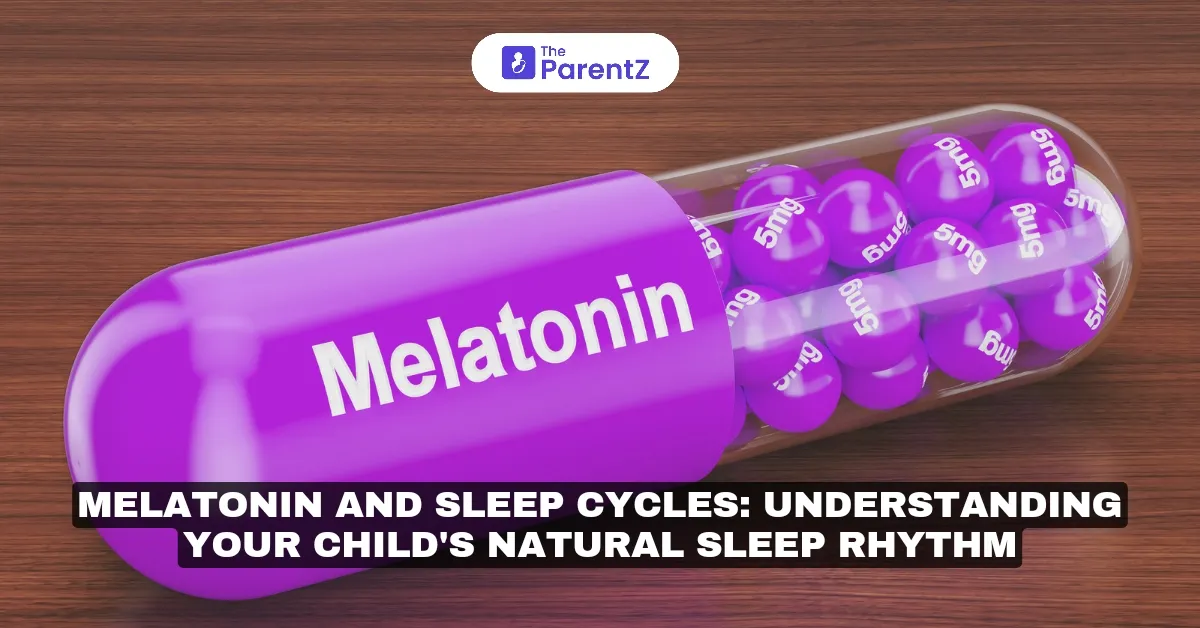Sleep is a complex biological process, and at the heart of this intricate system lies melatonin—a hormone that plays a massive role in regulating our sleep-wake cycles. For parents, understanding melatonin production can be the key to helping children develop healthy sleep patterns and overcome sleep-related challenges.
What is Melatonin?
Melatonin is a hormone secreted by the pineal gland in the brain, primarily in response to darkness. Its production begins around sunset, peaking during the night and tapering off with exposure to light in the morning. This natural cycle helps regulate circadian rhythms—the internal clock that decides when we feel awake or sleepy. In children, melatonin is vital for establishing healthy sleep patterns and supporting overall development.
The Role of Melatonin in Sleep Cycles
Melatonin influences various stages of sleep, particularly by promoting the onset of sleep and enhancing its quality. It helps facilitate the transition between wakefulness and sleep by decreasing body temperature and inducing feelings of drowsiness. In children, melatonin levels are typically higher than in adults, which is important for their growth and development.
Melatonin Production Across Age Groups
Melatonin production varies significantly throughout childhood:
Infants (0-12 Months)
In infants, melatonin levels are initially low but begin to rise dramatically around three months of age. Research shows that by this time, infants start to develop a regular sleep pattern, with nocturnal melatonin levels increasing significantly. Studies indicate that infants born during longer daylight months tend to produce more melatonin compared to those born in winter months due to seasonal variations in light exposure.
Toddlers (1-3 Years)
By toddlerhood, children require about 11-14 hours of sleep per day. Their melatonin levels continue to rise and typically peak during the night, helping them fall asleep more easily. However, toddlers may experience night terrors or disruptions due to their developing nervous systems.
Preschoolers (3-5 Years)
Preschoolers need about 10-13 hours of sleep each night. During this stage, melatonin production stabilizes but remains higher than in adults. Children who have a later dim-light melatonin onset (DLMO) often experience delayed bedtimes and wake times.
School-Age Children (6-13 Years)
School-age children typically require 9-12 hours of sleep. During this period, their bodies continue producing adequate amounts of melatonin, which supports cognitive function and emotional regulation. However, academic pressures and extracurricular activities can lead to irregular sleep patterns.
Teenagers (14-17 Years)
Teenagers need about 8-10 hours of sleep but often struggle due to social commitments and academic demands. Melatonin production begins to decline during adolescence, which can contribute to difficulties falling asleep at earlier times. This decline can lead to what is known as "delayed sleep phase syndrome," where teens prefer staying up late and sleeping in.
Practical Tips for Supporting Melatonin Production
- Create a Sleep-Friendly Environment: Ensure bedrooms are dark and quiet during nighttime hours. Consider blackout curtains or white noise machines if necessary.
- Establish Consistent Routines: A predictable bedtime routine signals the body that it’s time to wind down. Activities like reading or having a warm bath can help ease the transition into sleep.
- Limit Light Exposure Before Bedtime: Reduce screen time from devices that emit blue light at least one hour before bed. Blue light can inhibit melatonin production by signaling the brain that it’s still daytime.
- Encourage Outdoor Play During Daylight Hours: Exposure to natural sunlight helps regulate circadian rhythms and supports healthy melatonin production at night.
- Consider Melatonin Supplements Cautiously: While some parents may consider using melatonin supplements for their children experiencing significant sleep issues, it’s essential to consult with a healthcare provider first. Proper dosage and timing are crucial since inappropriate use can disrupt natural hormone production.
- Monitor Sleep Quality: Keep track of your child’s sleeping patterns and behaviors. If persistent issues arise, consult a pediatrician or a sleep specialist for guidance.
Conclusion
Understanding melatonin and sleep cycles empowers parents to support their children's natural sleep rhythms. Each child is unique, and patience is key to establishing healthy sleep patterns. Observation, consistency, and a holistic approach can make a huge difference in your child's sleep quality and overall well-being.
Remember, good sleep is not just measured by quantity but quality. By supporting your child's natural melatonin production, you're investing in their health, growth, and development.








Be the first one to comment on this story.